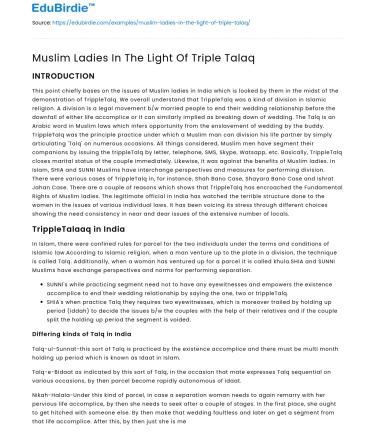Introduction
Triple Talaq, also known as Talaq-e-Biddat, is a form of Islamic divorce that allows a Muslim man to legally divorce his wife by pronouncing the word "talaq" three times in succession. This practice, though historically entrenched in certain Islamic communities, has been a subject of intense debate and scrutiny. Critics argue that it undermines the rights of Muslim women, leaving them vulnerable and marginalized. The issue of Triple Talaq gained significant attention with the landmark judgment by the Supreme Court of India in 2017, which declared the practice unconstitutional. This essay explores the implications of Triple Talaq on Muslim women, examining both the socio-legal challenges it presents and the broader reformative efforts to address gender inequalities within Islamic law.
Historical Context and Legal Challenges
The origins of Triple Talaq can be traced back to the early Islamic period, but its application has varied across different Muslim societies. Historically, it has been utilized as a tool for instant divorce, often leaving women with limited recourse for legal or financial support. According to the Quran, divorce is a serious matter and should be approached with caution and care, allowing for time and mediation to resolve marital disputes. However, the practice of Triple Talaq circumvents these principles, enabling a hasty dissolution of marriage without due process. In the contemporary context, the legal challenges associated with Triple Talaq are manifold. Women subjected to this practice often face significant hurdles in securing their rights to alimony, child custody, and property. A study by the Bharatiya Muslim Mahila Andolan (BMMA) revealed that many Muslim women in India live in fear of arbitrary divorce, underscoring the need for legal reforms to protect their rights. Moreover, the Supreme Court's verdict in 2017 was a pivotal moment in addressing these challenges, as it provided a legal framework for contesting the validity of Triple Talaq and advocating for women's rights.
Save your time!
We can take care of your essay
- Proper editing and formatting
- Free revision, title page, and bibliography
- Flexible prices and money-back guarantee
Social Implications and Reformative Efforts
The social implications of Triple Talaq are profound, affecting the lives of countless Muslim women. In many cases, women divorced through Triple Talaq are left without financial support or social security, which can lead to economic hardship and social ostracization. This practice often perpetuates a cycle of poverty and dependency, as women struggle to rebuild their lives in the absence of a supportive legal framework. Reformative efforts to address these issues have gained momentum in recent years, with various civil society organizations and women's rights activists advocating for comprehensive legal reforms. The passage of the Muslim Women (Protection of Rights on Marriage) Act in India is a testament to these efforts, as it criminalizes the practice of Triple Talaq and provides mechanisms for women's protection and empowerment. However, critics argue that legal reforms alone are insufficient to address the deeply entrenched patriarchal norms that underpin the practice. As such, there is a growing call for a holistic approach that includes education, community engagement, and policy interventions to transform societal attitudes towards gender equality in Muslim communities.
Counterarguments and Cultural Considerations
While the abolition of Triple Talaq has been hailed as a significant victory for women's rights, it has also faced criticism from certain quarters within the Muslim community. Some argue that the practice is a religious matter and that its regulation by the state constitutes an infringement on religious freedom. They contend that reforms should be driven by religious authorities and grounded in Islamic jurisprudence, rather than imposed by secular legal systems. This perspective highlights the cultural sensitivities and complexities involved in reforming personal laws within diverse societies. For example, the All India Muslim Personal Law Board (AIMPLB) has argued for internal reforms within the community, advocating for a gradual and consensus-driven approach to addressing issues related to Triple Talaq. Balancing the need for legal intervention with respect for cultural and religious diversity remains a critical challenge in this discourse, necessitating dialogue and collaboration among various stakeholders to achieve meaningful and sustainable change.
Conclusion
In conclusion, the practice of Triple Talaq has significant implications for Muslim women, both legally and socially. While recent legal reforms have marked a positive step towards safeguarding women's rights, the complexity of the issue requires a multifaceted approach that transcends legal frameworks. Addressing the root causes of gender inequality within Islamic societies necessitates a concerted effort involving education, community engagement, and policy interventions. By fostering a culture of respect and equality, it is possible to create an environment where Muslim women can exercise their rights and pursue their aspirations without fear of discrimination or marginalization. Ultimately, the journey towards gender justice in the context of Triple Talaq is an ongoing process that demands the collective efforts of individuals, communities, and institutions committed to advancing the cause of equality and justice for all.






 Stuck on your essay?
Stuck on your essay?

